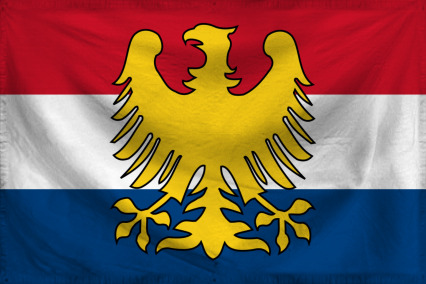Your nation's name (short): Lillorainen
Your nation's name (full): The Federation of Lillorainen
Population: (RP pop) 54 million
Government type: One-Party Federal Republic
Administrative divisions (name and number): 9 states (constituent republics)
Number and names of administrative levels: 4 levels. Federal Government, states, districts*, municipalities.
Is your nation a unitary or federal state?: Federal.
*the name for the district level varies by state - also, two states don't have this level.
2. Competences delegated to second level of your administration
Which of these policies are not maintained on a national level? (please tick - particuliarities may be specified)
[ ] Military
[ ] Monetary policies (e.g. currency)
[ ] Foreign relations
[ ] Regulations on nationality (e.g. issuing passports)
[ ] Customs
[x] Transport policy
[x] Post & Telecommunication
[x] Civil Law
[ ] Welfare
[x] Law enforcement (police, courts, ...)
[ ] Income tax
[x] Health policies
[ ] Drug policies
[ ] Gun legislation
[x] Culture policies (e.g. languages, religion etc.)
[x] Environment
[x] Education
[x] Agricultural policies
[x] Hunting law
[x] Land distribution
[x] Construction & Housing
[x] Energy and water supply
[x] Press & Broadcasting
[ ] Electoral organization (if applicable) N/A
[x] Notary law
[ ] Regulations on wage & salary
[x] Administration of third-level entities (e.g. Municipal Code)
[x] Regional Planning
3. Rights & Duties
Do second-level administrative entities have their own constitution?: Yes.
Do second-level administrative entities have their own parliaments?: Yes.
Is there a separate national parliament chamber for second-level administrative entities?: yes, the Federal Council (next to the Meritocratic Council).
Can second-level (or third, forth, ...) administrative entities set co-official languages next to your national one?: yes.
Can second-level (or third, forth, ...) administrative entities set their own taxes (e.g. corporate tax)?: yes.
If not, how are taxes distributed between the different levels?:
Do second-level administrative entities issue their own license plates? (leave blank if no cars or no plates in YN) no, we have a national system.
Is there an automatism of mutual financial compensation?: No, but states receive a certain amount from the Federal Government.
Do all regions of your nation have the equal amount of rights or are there differences?: They have equal rights.
Can administrative entities voluntarily delegate some of their own competences to the next lower level?: Yes.
Can administrative entities pass some of their own competences on to the next higher level?: Yes, but only exceptional.
Can administrative entities pass regional legislation that violates/contradicts national law?: No.
Can the national government pass legislation that violates/contradicts regional/municipal law?: Yes.
On a scale from 1 to 10, how closely do the different administrative levels cooperate? 6
(1 = they all deal with their own businesses; 10 = they're practically one heart and one soul)
Can administrative entities legally leave your nation? If so, how: There is no automatism for this.
Can foreign nations, or parts of them, legally join your nation? If so, how: Yes, by referendum in all states including the one that wishes to join - a 75% majority is necessary.
4. Conclusion
On a scale from 1 to 10, how sovereign are the different regions of your nation?: 8
(1 = total centralism; 10 = they're actually sovereign nation-states)
What is your nation's citizens' general opinion on the status quo? Do they wish more centralism, more regional sovereignty, or are they satisfied with it? Most people are satisfied with the federal system, since it does have its point - though, of course, some might point out it's expensive and somewhat bureaucratic.
What is the reason for the status quo? (historical reasons, ethnicities etc.): The Federation was formed by its states, which have been sovereign countries before. They all have different histories and an extremely different ethnic makeup.
- Code: Select all
[b][u]1. Basic information[/u][/b]
[b]Your nation's name (short):[/b]
[b]Your nation's name (full):[/b]
[b]Population:[/b] (RP pop)
[b]Government type:[/b]
[b]Administrative divisions (name and number):[/b]
[b]Number and names of administrative levels:[/b]
[b]Is your nation a unitary or federal state?:[/b]
[b][u]2. Competences delegated to second level of your administration[/u][/b]
[b]Which of these policies are [u]not[/u] maintained on a national level?[/b] (please tick - particuliarities may be specified)
[ ] Military
[ ] Monetary policies (e.g. currency)
[ ] Foreign relations
[ ] Regulations on nationality (e.g. issuing passports)
[ ] Customs
[ ] Transport policy
[ ] Post & Telecommunication
[ ] Civil Law
[ ] Welfare
[ ] Law enforcement (police, courts, ...)
[ ] Income tax
[ ] Health policies
[ ] Drug policies
[ ] Gun legislation
[ ] Culture policies (e.g. languages, religion etc.)
[ ] Environment
[ ] Education
[ ] Agricultural policies
[ ] Hunting law
[ ] Land distribution
[ ] Construction & Housing
[ ] Energy and water supply
[ ] Press & Broadcasting
[ ] Electoral organization (if applicable)
[ ] Notary law
[ ] Regulations on wage & salary
[ ] Administration of third-level entities (e.g. Municipal Code)
[ ] Regional Planning
[b][u]3. Rights & Duties[/u][/b]
[b]Do second-level administrative entities have their own constitution?:[/b]
[b]Do second-level administrative entities have their own parliaments?:[/b]
[b]Is there a separate national parliament chamber for second-level administrative entities?:[/b]
[b]Can second-level (or third, forth, ...) administrative entities set co-official languages next to your national one?:[/b]
[b]Can second-level (or third, forth, ...) administrative entities set their own taxes (e.g. corporate tax)?:[/b]
[b]If not, how are taxes distributed between the different levels?:[/b]
[b]Do second-level administrative entities issue their own license plates?[/b] (leave blank if no cars or no plates in YN)
[b]Is there an automatism of mutual financial compensation?:[/b]
[b]Do all regions of your nation have the equal amount of rights or are there differences?:[/b]
[b]Can administrative entities voluntarily delegate some of their own competences to the next lower level?:[/b]
[b]Can administrative entities pass some of their own competences on to the next higher level?:[/b]
[b]Can administrative entities pass regional legislation that violates/contradicts national law?:[/b]
[b]Can the national government pass legislation that violates/contradicts regional/municipal law?:[/b]
[b]On a scale from 1 to 10, how closely do the different administrative levels cooperate?[/b]
(1 = they all deal with their own businesses; 10 = they're practically one heart and one soul)
[b]Can administrative entities legally leave your nation? If so, how:[/b]
[b]Can foreign nations, or parts of them, legally join your nation? If so, how:[/b]
[b][u]4. Conclusion[/u][/b]
[b]On a scale from 1 to 10, how sovereign are the different regions of your nation?[/b]:
(1 = total centralism; 10 = they're actually sovereign nation-states)
[b]What is your nation's citizens' general opinion on the status quo? Do they wish more centralism, more regional sovereignty, or are they satisfied with it?[/b]
[b]What is the reason for the status quo? (historical reasons, ethnicities etc.):[/b]











